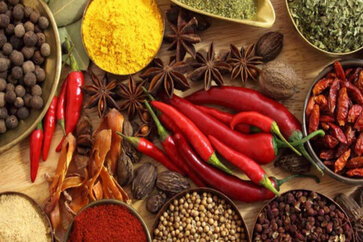Ayurvedic Medicine For PCOS Problem
 Polycystic Ovarian Syndrome generally known as (PCOS) is an ailment that can affect women of any age. It is the most common endocrine problem in women of reproductive age, and one of the leading causes of infertility.
Polycystic Ovarian Syndrome generally known as (PCOS) is an ailment that can affect women of any age. It is the most common endocrine problem in women of reproductive age, and one of the leading causes of infertility.
The most common symptoms are irregular or absent menstrual periods. The other symptoms like ovarian cysts, and excessive or spotting menstruation.
Excessive androgenic hormones such as testosterone result in male pattern hair growth and acne, and insulin resistance, often associated with obesity and diabetes.
Other hormone levels tend to fall, and women who are affected tend to be sluggish, slow, heavy, and get unmotivated.
Ayurvedic view on PCOS
According to Ayurveda, the cause of this condition is due to the excess production of Kapha that affects the reproductive organs.
The consequent accumulation of fat affects the liver, resulting in hormonal imbalance with some levels rising while others fall.
Ayurvedic treatment for PCOS mainly focuses on the reduction of Kapha and promoting the physiological changes that impact the way in which fat accumulates in different parts of the body. The liver is also treated and hormonal balance is directed with the help of Ayurvedic formulations.
Some of the same medications are used for the treatment of diabetes which is helpful. The remedies used for congestion are also effective to remove excess mucus. A dietary plan is an advice for losing weight and balancing insulin levels.
The Main Cause Of PCOS
According to Ayurveda, the POCS is due to an imbalance of Kapha, which causes blockages in the flow of Vata and Pitta, blocking its elemental movement. However, the actual cause of PCOS is unknown. But researchers believe that the problem is due to the resistance to the hormone insulin.
An extra level of insulin causes an imbalance of luteinizing hormone (LH) compared with follicle-stimulating hormone (FSH). As a result, the follicles in the ovaries produce more male hormone testosterone compared to the female hormone estrogen.
It is also found that PCOS aliments are hereditary too. Studies indicate that women with a family history of polycystic ovaries are 50 percent more likely to cause PCOS.
The Symptoms Of PCOS
PCOS is a disease syndrome defined by a set of signs and symptoms. The symptoms of polycystic ovary syndrome patient experience can be very different from one patient to another.
If you have two or more of the symptoms given below, you must go to a background check to determine if you need treatment for PCOS or not:
- Skin problems such as skin tags, acne, and darkening of the skin
- Weight problems, generally the weight gain around the waist
- Excess or unwanted facial or body hair growth
- Irregular or absence of menstrual periods
- Thinning or Lessing of hair on the scalp
- Infertility
Foods To Avoid In PCOS
1. Bad fats
All fats such as saturated, hydrogenated, and trans fats are to be avoided. Saturated fats, found in dairy products and red meat may cause an increase in estrogen production.
The absorption of some nutrients can cause weight gain. When more amount of cooking oil is used the trans-hydrogenated fats in cooking oil, increase your risk of heart disease and may also cause diabetes, which is at risk of getting PCOS.
2. Dairy Products
Milk leads to an increase in testosterone levels as it contains a protein that limits the normal processing of testosterone in the body.
When the testosterone levels are not managed testosterone levels keep going up. As our testosterone levels are already likely to be high, dairy only worsens the problem.
3. Foods that have high glycemic index (GI) foods
Foods that have a high GI lead to a rapid rise in the levels of blood sugar. Insulin levels continue to play to cope with the glucose in the bloodstream.
In general, high-GI foods have been processed to remove fiber and other nutrients that may be tasty, but they are high in calories while lacking nutrients.
Some of the high (GI) foods that should be avoided are mashed potatoes white rice, muffins, rice cakes, and cakes.
Foods To Include In PCOS
1. White color Vegetables
White color or so-called brightly colored vegetables are a rich source of antioxidants and one must include in a PCOS diet. It has been found that women with PCOS have a higher rate of oxidative stress. This means physiological stress is placed on the body when it comes to a large number of free radicals. To combat oxidative stress we need antioxidants.
2. Fruits
Fruit is a rich source of vitamins, minerals, fiber, and phytonutrients their people with PCOS problems must include in their diet.
Many women with PCOS are reluctant to eat fruit or avoid fruit because it can cause increased levels of blood sugar and therefore insulin. However, fruit continues to play an important role in supplying the nutrients we need to fight PCOS.
Therefore, try to eat fruit that has a lower GI and has a handful of seeds or nuts with fruit in the form of protein that helps regulate sugar spike resulting fruit.
Fruit with a low GI value are cherries, prunes plum, grapefruit, raisins, apples, pears, coconut, apples, coconut milk, dried apricots, kiwi, and orange juice.
3. Vegetables and Green leafy
Vegetables and Green leafy have more nutrients per calorie than any other food. They are rich in potassium, calcium, iron, and magnesium they also have as vitamins such B, K, C, and E, particularly Vitamin B
Vitamin B plays an important role in managing the symptoms of PCOS. Vitamin B is a key factor for balancing of fat metabolism, sugar, and thyroid function and helps in balancing hormonal. It plays a key role in the management of PCOS.
Useful Herbs for PCOS
1. Vitex
Vitex is a popular and effective herb for treating hormonal imbalances and balancing the reproductive system in females. As it has the properties of stimulating and normalizing the pituitary gland it is a good herb for PCOS.
The pituitary gland plays an important role in controlling and releasing the LH hormone. It is an important herb in controlling PCOS. But if you are having any treatment of IVF or birth control pills you should avoid it.
2. Cinnamon
Cinnamon is another spice that is capable to reduce insulin resistance; sometimes it gives a high-speed result depending on the body’s structure.
Cinnamon slows and breakdown carbohydrates in the body. Therefore it is very helpful for women with polycystic ovary syndrome.
3. Saw Palmetto
Saw Palmetto helps to break down DHT stops that are very important in leveling the excess estrogen, which is a common problem in women with PCOS. In turn, this can help you lose weight, increase libido, and regulate hormones.
4. Maca Roots
Maca roots are ideal in balance the number of estrogens and progesterone in the body. Thus helps to give a healthy menstrual cycle it is also called a “superfood” for fertility. That is a reason it makes it a very popular choice for women who are having trouble conceiving
It is very important to consult your doctor before starting any herbal supplements or medication as they can give you perfect advice.























